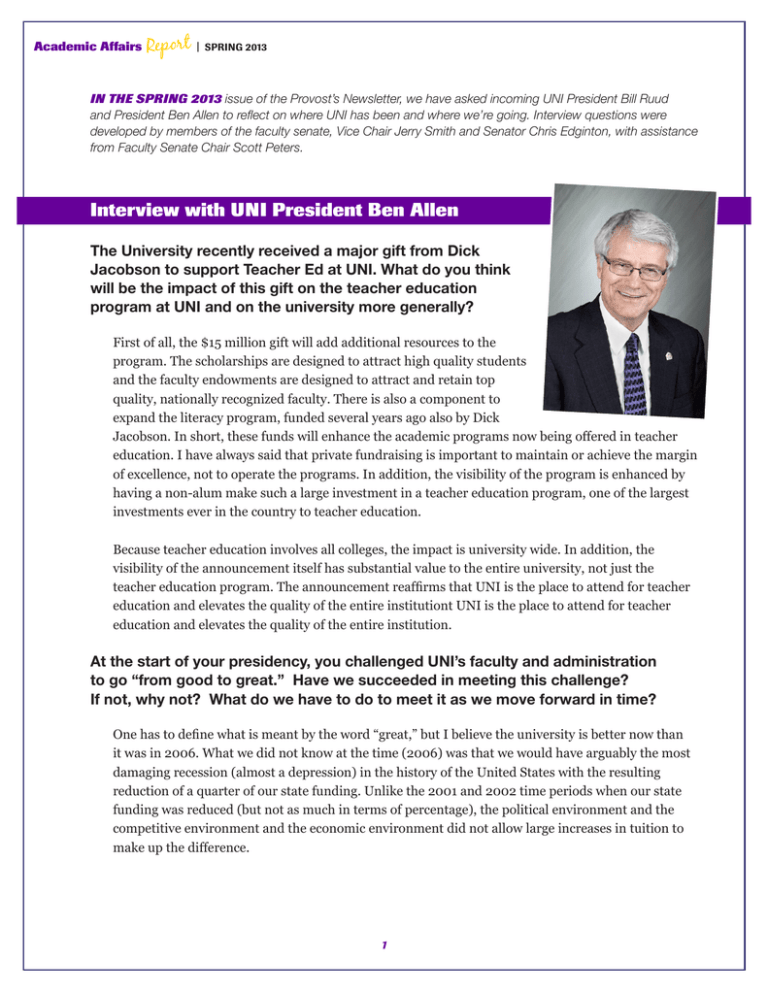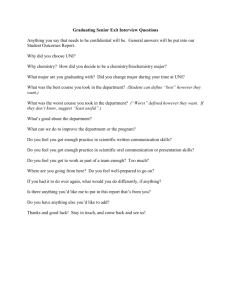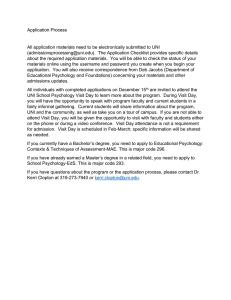Report
advertisement

Academic Affairs Report | SPRING 2013 IN THE SPRING 2013 issue of the Provost’s Newsletter, we have asked incoming UNI President Bill Ruud and President Ben Allen to reflect on where UNI has been and where we’re going. Interview questions were developed by members of the faculty senate, Vice Chair Jerry Smith and Senator Chris Edginton, with assistance from Faculty Senate Chair Scott Peters. Interview with UNI President Ben Allen The University recently received a major gift from Dick Jacobson to support Teacher Ed at UNI. What do you think will be the impact of this gift on the teacher education program at UNI and on the university more generally? First of all, the $15 million gift will add additional resources to the program. The scholarships are designed to attract high quality students and the faculty endowments are designed to attract and retain top quality, nationally recognized faculty. There is also a component to expand the literacy program, funded several years ago also by Dick Jacobson. In short, these funds will enhance the academic programs now being offered in teacher education. I have always said that private fundraising is important to maintain or achieve the margin of excellence, not to operate the programs. In addition, the visibility of the program is enhanced by having a non-alum make such a large investment in a teacher education program, one of the largest investments ever in the country to teacher education. Because teacher education involves all colleges, the impact is university wide. In addition, the visibility of the announcement itself has substantial value to the entire university, not just the teacher education program. The announcement reaffirms that UNI is the place to attend for teacher education and elevates the quality of the entire institutiont UNI is the place to attend for teacher education and elevates the quality of the entire institution. At the start of your presidency, you challenged UNI’s faculty and administration to go “from good to great.” Have we succeeded in meeting this challenge? If not, why not? What do we have to do to meet it as we move forward in time? One has to define what is meant by the word “great,” but I believe the university is better now than it was in 2006. What we did not know at the time (2006) was that we would have arguably the most damaging recession (almost a depression) in the history of the United States with the resulting reduction of a quarter of our state funding. Unlike the 2001 and 2002 time periods when our state funding was reduced (but not as much in terms of percentage), the political environment and the competitive environment and the economic environment did not allow large increases in tuition to make up the difference. 1 Academic Affairs Report | SPRING 2013 Interview with UNI President Ben Allen – Continued I still believe that the basic message of the book “Good to Great” provides a good guideline on how to continue that journey from good to great. One is that we have to have a discussion of the “brutal facts” of where we are strong and where we need to improve. We need to focus on the areas in which we are the very best, where we are passionate about and where the economic engine indicates we should be. We need to better support the faculty that we have and that will require more resources or a more focused set of academic programs. Distinguishing ourselves from Iowa State University and the University of Iowa is also critically important. What are the major challenges facing UNI in the coming years? What should the university’s faculty and administration be doing now to meet those challenges? Some of the major challenges facing UNI are unique to it, while others are common among all comprehensive universities, while others are common to all universities (except the very elite). My focus will be on the identification of the challenges (the list below is not exhaustive) and not on how to meet those challenges. UNI will face increasing competition for students in the near term because of a more aggressive recruiting policy of the University of Iowa, a continuation of the aggressive recruiting practices of Iowa State University and more aggressive recruiting practices by private colleges, particularly in the Northeast part of the state, given the existence of excess capacity among the private colleges. Competition from community colleges will continue to grow because their enrollments declined this past year. In short, the competitive environment has changed substantially from three years ago with several of the competitors having substantially more resources than UNI. We need to be more aggressive and smarter in our marketing and recruiting. In addition, we need to establish UNI as the true public university for Iowans and accordingly, we should receive more of the state funding than we are now receiving. The three-year phase in of $4 million additional state dollars is a move in the right direction, but does not address the long-term underfunding issue based upon any reasonable set of assumptions on how the state funding should have been allocated over the last 20 years. Increasing the level of state funding will be challenging in good economic times and extraordinarily challenging in bad economic times. The faculty and administrators will have to make some changes moving forward without losing the culture of helping students succeed that we now have at UNI. For example, we will have to be more willing to explore options of partnerships that might lead to situations that will have more UNI students who never attend classes in person on campus. While UNI has several advantages in the competition to attract Iowa high school graduates – notably our size, small classes taught by regular faculty and tuition rates that are lower than private schools – these may not be enough to fill our incoming freshman classes. Are there other competitive advantages that UNI has or should develop to boost enrollments? 2 Academic Affairs Report | SPRING 2013 Interview with UNI President Ben Allen – Continued First, we need to better market the fact that we have the right size university, smaller classes taught by regular faculty and, more importantly, market that the other two public universities do not. Having said that, however, we have to focus more on outcomes than inputs. For example, class size is important to the parents but not to the students in general based upon a recent consultant’s report. We need to examine how we can keep the focus on personalized education while having some of the classes being larger. We have to focus more of our recruiting efforts talking about successful alums from all of our programs and that we offer majors that are perceived to be tied to more job opportunities. Parents want more evidence of how their investment, a relatively large investment for many, will pay off in terms of career opportunities for their students. That is the focus of most of the parents today and I assume many of the students. We have to show that the majors and minors we offer meet that objective and need to offer new majors that do. Second, we have to reduce the cost of education to the students and their parents by using more technology, allowing larger class sizes when appropriate, focus fundraising efforts on scholarships (which is being done) and getting the state to better fund UNI to catch up to the average level of funding for all Regents universities. We have to find ways to lower the cost of education while making a stronger case for how our education at UNI is affordable. Projecting forward, what do you see as the future of UNI to the state, region, nation and internationally? I will let President Ruud focus on this one as he works with the university community to develop his vision for the future of the university. Looking back over your tenure as president of UNI, what do you believe were the most significant gains for the university? First, I wanted the university to become more visible in the State of Iowa. I believe it has, although some of that has been accomplished as the result of the changes we made last year and the reaction on campus to these changes. The very visible events, such as the visit by the Dalai Lama, the First Lady and the defeat of the University of Kansas by our men’s basketball team, were just a sample of the events that helped make this happen. The importance of providing leadership in selected areas, like STEM education, also increased the visibility of the university. Second, we established state-wide leadership in selected areas. For example, we did that in STEM education. First, UNI became the leader of the Iowa Mathematics and Science Education Partnership (IMSEP) where we were the lead institution working with our much larger sister institutions, Iowa State and the University of Iowa. Second, we maintained our leadership role when IMSEP became the foundation of the Governor’s STEM Advisory Council with UNI Professor Jeff Weld maintaining his leadership role as Executive Director and my becoming Co-Chair of the Council working with fellow Co-Chair Lt. Governor Reynolds. 3 Academic Affairs Report | SPRING 2013 Interview with UNI President Ben Allen – Continued Third, we raised the bar substantially in the area of fundraising and we focused the fundraising on faculty and students, not buildings. Almost all of the funds raised (more than $150 million) in the Imagine the Impact Campaign went toward academic programs and academic scholarships. We were able to focus many of those funds on a key priority area for the university – teacher education because of the interest in that area and the generosity of Dick Jacobson. He invested almost $30 million in the general area of teacher education. Fourth, although much work remains, I believe through strategic hires and new programming by a number of people, the importance of increased diversity for a high quality educational experience has been more clearly demonstrated. The absolute growth of diversity in our student body is not large, but a foundation for future growth is being built. Finally, the financial health of the university was not in good shape in 2006 with underinvestment in some key areas including learning technologies and an information system for student services, among other areas, and a weak balance sheet. The financial situation for the university remains challenged for a number of reasons but there is more awareness of the relationship between financial issues and sustainability of academic programs and other programs. In addition, we helped make the case that we needed additional special funding over a three year period because of our unique financial challenges resulting for having such a high percentage of resident students. In your mind, what plans did you have that you were not able to accomplish? I will comment on only one area. Our outstanding faculty and staff serve the students exceptionally well. Students have a very good educational experience at UNI. The students are overwhelmingly very satisfied with the education they receive here as are their parents. My plans to make the larger region (Midwest) and the nation more aware of how special this university is from an academic and learning perspective were not realized. 4



